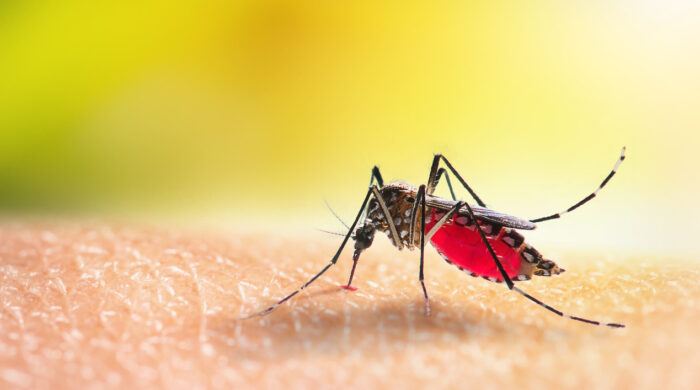Insects are usually nothing more than tiny intrusive pesks, but occasionally, they can be dangerous. While most insect bites and stings hurt for a moment and then disappear in a short time, some insects can transmit disease, cause infection, or trigger an allergic reaction. Ticks, mosquitoes, and flies are especially well known for transmitting viruses from one carrier to another. For these reasons, we’ve compiled a list of ways you can protect yourself and your family against insect bites and stings throughout the year.
How To Avoid Insect Bites
Although insects are difficult to avoid altogether, there are simple measures you can take to protect yourself against bites and sings. Here are a few, easy-to-implement methods for staying safe against insects this year.
Insect Repellent
When you’re planning to spend time outdoors, avoid wearing fragrant lotions or perfumes; insects love sweet smells and will be drawn to you. Instead, opt for non-scented products, and cover your clothing and exposed skin with insect repellent.
Insect repellant is a simple and effective way to prevent insect bites and stings. When purchasing insect repellent, make sure that it is EPA registered and that it protects against insects, including ticks, and mosquitoes. Choose products that contain the following ingredients:
- DEET – No insect repellent is quite as effective as DEET. According to the American Academy of Pediatrics, DEET should not be used on babies younger than 2 months old.
- Picardin – Very effective for preventing tick and mosquito bites.
- Oil of lemon eucalyptus (OLE) or para-menthane-diol (PMD) – This essential oil is a natural insect repellent.
- 2-undecanone
If you opt for natural repellent alternatives, be warned that these products are not recommended, and their effectiveness is unknown.
When applying repellent make sure to follow the guidelines below:
- Read and follow the directions on the label.
- Apply repellent last, over lotions, sunscreens, and clothing.
- Avoid products that are both sunscreen and repellent. These are often not as effective and may cause irritation to the skin.
- For added protection, choose clothing and outdoor gear that is treated with permethrin (insect repellent).
Clothing
Exposed skin is immediately more prone to insect bites, even if it’s covered in insect repellent, so when you plan to spend time in nature or in wooded areas, wear clothing that provides protection. Cover your head with a hat and your body with long sleeves, jackets, full pants, socks, and full shoes or boots when you know you’ll be outdoors. For additional protection, wear clothing that is treated with permethrin (mosquito repellant).
Insect repellent isn’t recommended for babies under 2 months old, so make sure children are covered completely with thick clothing and blankets, and use mosquito nets around strollers and cribs whenever possible.
Home/Lodging
The key to protecting your home from insect bites and stings is to create a barrier so that insects cannot get in. Keep doors and windows shut as much as possible, and choose lodging with screen doors and windows. Keep your environment air conditioned with good airflow, and check mattresses, couches, and other furniture for bed bugs whenever you travel. Do research before traveling anywhere new, and make sure you’re prepared to protect yourself and your family against the local insects. Some countries require you to have certain vaccinations before entering. Speak to your physician about any concerns you may have about insects, local and abroad.
Note: If you are pregnant or may become pregnant, avoid traveling to areas with Zika outbreaks, as the Zika virus has been known to cause birth defects.
What To Do If You’re Bitten
Even if you follow all measures for prevention, you still may get bitten or stung by an insect. If you are bitten, follow these steps:
- Check the site of the bite/sting and remove any stingers or insects if they are still on your skin.
- Sanitize the affected area with warm water and soap.
- Ice the area for at least ten minutes.
- Elevate the site to prevent swelling.
- Avoid touching or scratching the site. This can break and irritate the skin.
When To Seek Care
Most insect bites cause an immediate reaction that lessens and disappears within a few hours or days.
Some normal reactions are:
- Swelling around the site
- The appearance of a red or white raised bump on the site
- Pain or itching
- General discomfort for a few days at most
If you are unsure if your reaction to a bite or sting is normal, we encourage you to consult a professional. Call your physician or seek medical care if you are concerned about a bite or sting, or if you experience any of the following:
- Your symptoms last more than a few days or become more severe.
- The perimeter around your bite shows signs of infection such as pus, severe swelling, or redness.
- You are stung near your eye or in your mouth or throat.
- You experience fever-like symptoms or severe pain.
Occasionally, bug bites and stings can be life-threatening. If you experience these life-threatening symptoms, call 911 immediately.
- Difficulty breathing
- Dizziness
- Nausea or vomiting
- Rapid heart rate
- Difficulty swallowing or swollen throat, mouth, or face
- Fainting or unconsciousness
Insects are active year-round, in both cold and warm weather, in the rainy season, and during night and day. Be diligent in protecting your family against insect bites, and don’t hesitate to call your physician or seek emergency care if you experience a serious or allergic reaction to an insect bite.
